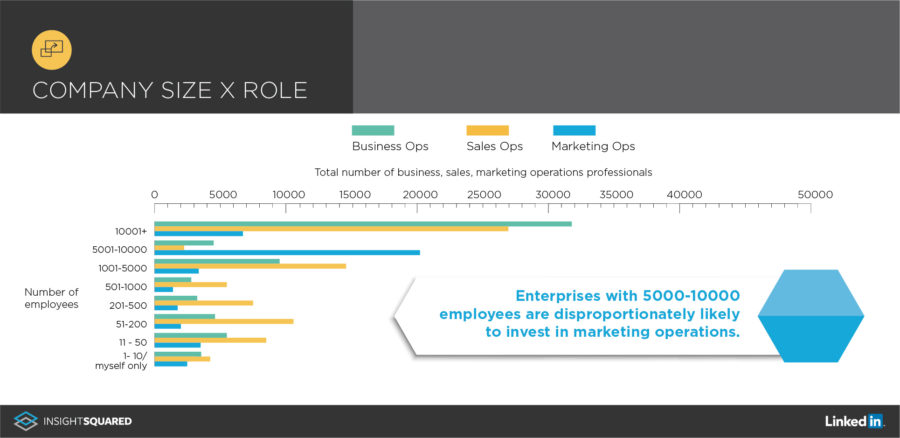Operations occur near constantly across your organization through processes and details that you may never even be aware of. As a marketer, you’re likely most familiar with marketing operations, and hopefully, sales operations because of your partnership with sales, but then maybe less familiar with business operations. But when it comes down to it, operations and the people that power those functions are absolutely critical to the work you do and the smooth functioning of your business.
In a recent infographic, InsightSquared partnered with LinkedIn’s Content and Research teams to examine the basic characteristics of three critical operations roles—marketing operations, business operations, and sales operations. This blog will take a look at a few of the key findings and define some of the similarities and differences between the roles.
Operations 101
Marketing Operations
Regardless of whether you’re a marketer that leans more heavily on the art or the science of marketing, you need marketing operations (MOPS). A solid MOPS team is a critical resource to any marketing team and the broader organization. They operate at both a strategic and tactical level—working on key business initiatives down to day to day marketing activities. Some of their critical functions include managing the data and its flow in and out of your MarTech stack, acting as a liaison with other teams like sales, product, and engineering, and creating and enforcing guidelines for your marketing technology processes for team members.
Business Operations
Like marketing operations, business operations (BizOps) is critical to strategic and tactical functions of a business. There are tons of recurring activities that take place to help a business run efficiently and effectively and allow its leaders to make informed, thoughtful decisions spanning departments and processes. BizOps often sits at the center of those activities and helps by synthesizing data across the business into clear, and actionable insights. According to LinkedIn, this can mean coordinating complex sales and marketing strategies and evaluating the impact of those strategies on the bottom line. But, business operations do not stop there, as it often evaluates the success of programs against a long-term strategy, helps ensure transparency between departments, and report on top-line initiatives.
Sales Operations
Sales operations, like business operations and marketing operations, is a critical function to any business that sells something, especially if they have a sales team. Simply stated, sales and its processes are very measurable and tied directly to company revenue. With that in mind, and according to HBR, sales operations (SOPs) at most organizations is on deck to oversee sales performance—from territory alignment, customer profiling, to targeting activities, administer to the compensation plan and goal planning for the sales team, manage their CRM system and processes (and therefore work VERY closely with their MOPs counterparts), and provide data, analysis, modeling, and reporting for business review.
Key Findings
So, now with our understanding of how foundational our different operations groups are within our businesses, let’s take a look at some of the key findings of what it takes to be and hire operations professionals from InsightSquared and LinkedIn as they looked across thousands of data points.
Enterprises Invest More Heavily in Operations
There are more operations professionals at enterprise organizations, specifically very large enterprises than there are at their small to medium business counterparts. When I saw this stat, specifically the fact that the heaviest investment was in business operations versus marketing or sales, it made sense to me because larger organizations tend to have more disparate data and processes that need to be evaluated and understood in order to see the big picture. It was also interesting to look at the data and see that organizations in the 1001-5000 employee band seem to invest predominantly in sales operations while the next band, 5001-10,000 employees, invests more heavily in marketing operations. This may be indicative of the goals or challenges that organizations at these sizes face at this specific stages of growth.
There Not a Standard Certification
Now that you’re thoroughly convinced that operations are not only foundational to your success but probably a huge time-saver and resource you’re probably wondering, “How can I hire an A+ Operations person?”. Well, if you’re looking to hire an operations professional there are a variety of skills you can look for, but a standardized certification across business, marketing, and sales operations simply doesn’t exist. The data shows that while there are some certifications, a relatively low percentage of operations professionals get them and those that do seem to get them for their specific area of operations—for example, being a Marketo Certified Expert and working in Marketing Operations.
Industries are Investing in Operations at Different Rates
Operations—business, marketing, and sales—seems like a fairly critical function for any business, but the data shows that some sectors are adopting and hiring operations professionals at faster rates than others, and it varies based on the type of operations professional you’re looking to add to your team. You’re probably not surprised to see Technology & Software sectors lead the charge on business operations and marketing operations, but you may have been surprised, like me, to see that they don’t when it comes to hiring sales operations professionals. In fact, Retail & Consumer Products leads the way for sales operations hiring. More interesting, the same industries don’t appear for each type of operations, indicating that they may have some ground to cover from both a data and insights and the people-hiring perspective if they want to achieve at their peak levels.
The last finding? There is a definite demand for operations professionals. With over 60,000 open roles on LinkedIn, it seems the time is ripe for someone looking to work in this field. And if you think about how much data marketers, sales teams and businesses sift through on a day to day basis, hiring people to help them digest, and interpret that data to make intelligent and informed decisions makes sense.
Interested in learning more about the data? Check out the full infographic here.
Did any of these results surprise you? Or, how do you see and understand the role of operations at your organization either similarly or differently? Share your thoughts in the comments below.



